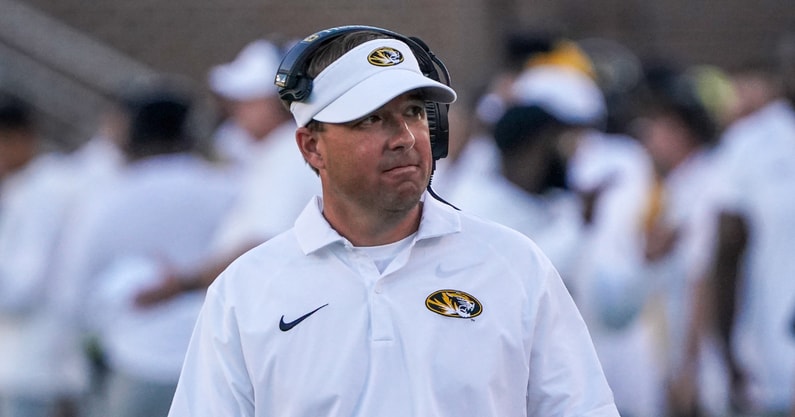Eli Drinkwitz begs NCAA, House settlement for clarity: ‘I don’t know what the crap is going on’

As spring practice continues across the country, coaches – like many around college athletics – are watching closely as the House v. NCAA settlement final approval process continues. The final approval hearing took place Monday, and Judge Claudia Wilken told both sides to reconvene next week after revisiting certain areas of the agreement.
If the settlement goes into effect, it would usher in the revenue-sharing era in college sports while also implementing roster limits. Roster limits were a crucial part of Monday’s hearing as Wilken suggested potentially grandfathering spots for athletes currently on rosters so they don’t lose their spots.
To Missouri coach Eli Drinkwitz, it’s all part of navigating the unknowns about the future of college football. He, much like SEC commissioner Greg Sankey, said he simply wants answers.
“I spend a ton of time trying to figure out the new revenue-share system,” Drinkwitz told reporters Tuesday. “How are you going to divide the money and the cap, and what are we going to do for NIL, and how do we get to 105? Then, yesterday, the judge says we may grandfather in roster limits. So, like, I don’t know what the crap is going on. You waste a lot of mental energy, and I’ve heard a lot of players – we told all our guys in December, like, this is what we think the new framework is going to be.
“Now, if they go back to grandfathering it in, it’s just frustrating. Let the practitioners have a say in what we’re doing instead of – I’m not going there anymore. But we’ll adapt. We’ll adapt to whatever they say. We’ll find a way, we’ll figure it out. Yeah. We’ll figure it out.”
Under the House settlement, a roster limit of 105 spots would be in place for football – down from the 120 slots, including 85 scholarships, currently allotted. The SEC, however, said it would sit at 85 for the first year of the agreement.
Top 10
- 1
Kyren Lacy
LSU WR passes away
- 2New
Dan Lanning
Pressed for Nico comment
- 3Hot
No More Nico
Neyland removes QB pics from stadium
- 4Trending
Mario Cristobal
Warns team on holdouts
- 5
DJ Lagway injury
Florida QB's timeline updated
Get the On3 Top 10 to your inbox every morning
By clicking "Subscribe to Newsletter", I agree to On3's Privacy Notice, Terms, and use of my personal information described therein.
Eli Drinkwitz: ‘We can’t have a lawsuit every stinking day’
When looking at the state of college sports, Eli Drinkwitz also called on the need for stability from a legal standpoint. He pointed out the amount of lawsuits targeting NCAA rules, which led to major changes.
As the settlement approval process continues, Drinkwitz expressed his hope for college athletics to keep its heart and soul. He also spoke in support of sports beyond football and basketball as they would also be affected by the settlement.
“My hope is that we understand this is an unbelievable game,” Drinkwitz said. “College athletics is a worthwhile fabric of the culture of the United States of America – not just football, not just basketball, not just revenue-generating sports, but also the Olympic sports. They all matter. And we need to have some sort of governing structure that doesn’t have a lawsuit every stinking day. Like, I get it. But man, we can’t have a lawsuit every single day that dramatically shifts the rules. So we have to have some sort of protection so that we can move forward with a great game.
“I mean, last night was phenomenal to watch. The Final Four was so, so awesome to watch. The entire tournament was enjoyable. College football is enjoyable. Watching – shoutout to Shannon [Welker] and our women’s gymnastics team. Watching with my daughters on Sunday night, our women’s gymnastics team qualify for the Elite Eight and the national championship in Fort Worth is phenomenal. Please, please, please, whoever’s in charge – I don’t know who’s in charge, nobody knows who’s in charge – can we get some sort of structure in place that we don’t have to have lawsuits every single day that changes how we operate so that we can continue this awesome opportunity that we have for these students to have scholarships, to get an education, but also the joy that we can bring to the fan base and to the people of this country?”